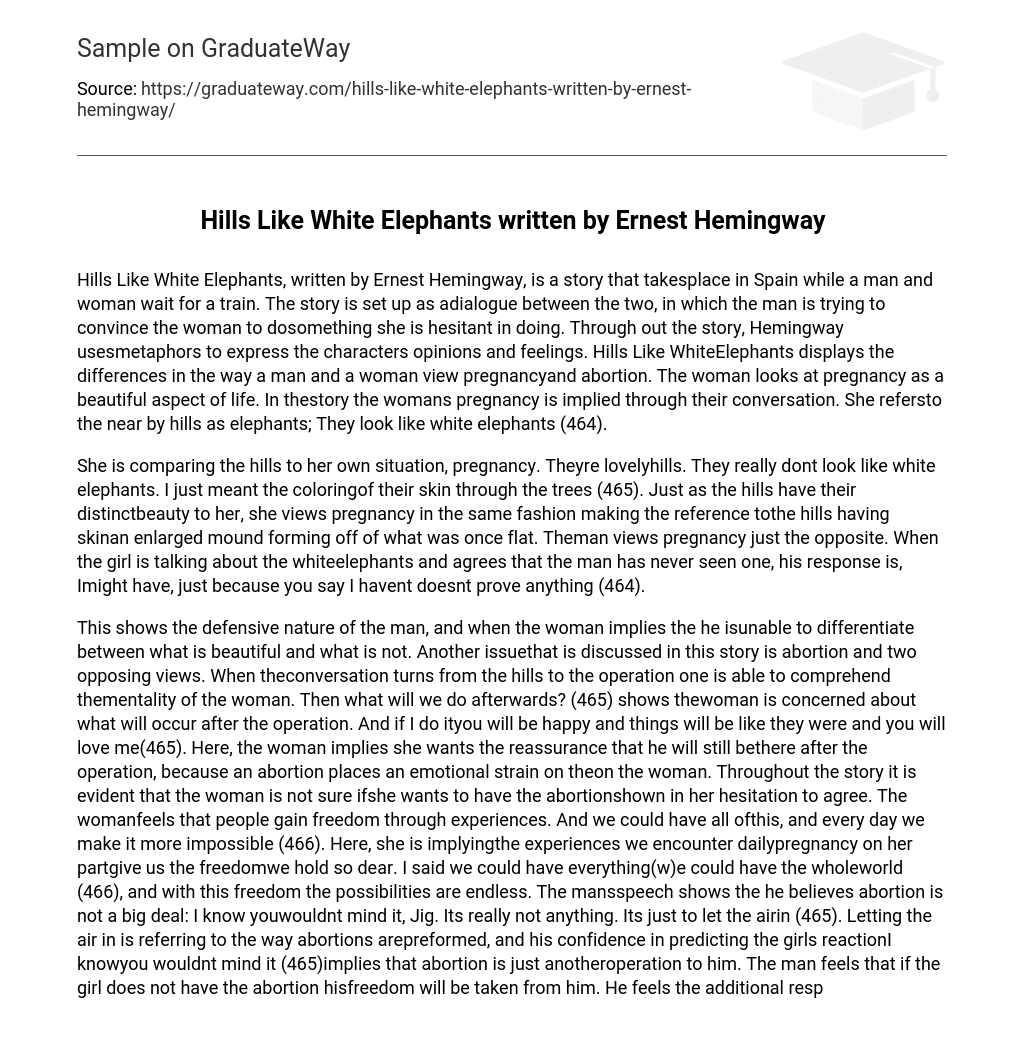Hills Like White Elephants, written by Ernest Hemingway, is a story that takesplace in Spain while a man and woman wait for a train. The story is set up as adialogue between the two, in which the man is trying to convince the woman to dosomething she is hesitant in doing. Through out the story, Hemingway usesmetaphors to express the characters opinions and feelings. Hills Like WhiteElephants displays the differences in the way a man and a woman view pregnancyand abortion. The woman looks at pregnancy as a beautiful aspect of life. In thestory the womans pregnancy is implied through their conversation. She refersto the near by hills as elephants; They look like white elephants (464).
She is comparing the hills to her own situation, pregnancy. Theyre lovelyhills. They really dont look like white elephants. I just meant the coloringof their skin through the trees (465). Just as the hills have their distinctbeauty to her, she views pregnancy in the same fashion making the reference tothe hills having skinan enlarged mound forming off of what was once flat. Theman views pregnancy just the opposite. When the girl is talking about the whiteelephants and agrees that the man has never seen one, his response is, Imight have, just because you say I havent doesnt prove anything (464).
This shows the defensive nature of the man, and when the woman implies the he isunable to differentiate between what is beautiful and what is not. Another issuethat is discussed in this story is abortion and two opposing views. When theconversation turns from the hills to the operation one is able to comprehend thementality of the woman. Then what will we do afterwards? (465) shows thewoman is concerned about what will occur after the operation. And if I do ityou will be happy and things will be like they were and you will love me(465). Here, the woman implies she wants the reassurance that he will still bethere after the operation, because an abortion places an emotional strain on theon the woman. Throughout the story it is evident that the woman is not sure ifshe wants to have the abortionshown in her hesitation to agree. The womanfeels that people gain freedom through experiences. And we could have all ofthis, and every day we make it more impossible (466). Here, she is implyingthe experiences we encounter dailypregnancy on her partgive us the freedomwe hold so dear. I said we could have everything(w)e could have the wholeworld (466), and with this freedom the possibilities are endless. The mansspeech shows the he believes abortion is not a big deal: I know youwouldnt mind it, Jig. Its really not anything. Its just to let the airin (465). Letting the air in is referring to the way abortions arepreformed, and his confidence in predicting the girls reactionI knowyou wouldnt mind it (465)implies that abortion is just anotheroperation to him. The man feels that if the girl does not have the abortion hisfreedom will be taken from him. He feels the additional responsibility wouldlimit his opportunities and thus his freedom. When the girl says, Itsours, referring to everything the world has to offer, the man replies, No,it isnt. And once they take it away, you can never get it back (466). Heis telling her that once they take ittheir freedomaway they will notbe able to reclaim it. At the end of the story, the main points are reinforced.
The man returns from taking the bags to the tracks and asks if the woman is ok.
Her reply is, I feel fine. There is nothing wrong with me. I feel fine(467). Here she reiterates that she sees the pregnancy as an experience that isnot necessarily bad (as the gentleman is implying). The man, on the other hand,feels nothing has been accomplished. He picked up the two heavy bags and carriedthem around the station to the other tracks. He looked up the tracks but couldnot see the train. Coming back, he walked through the barroom, where peoplewaiting for the train were drinking. He drank an Anis at the bar and looked atthe people. They were all waiting reasonably for the train. He went back throughthe bead curtain. She was sitting there and smiled at him. Do you feelbetter? (467) This is a major metaphor in the story explaining the manssituation at the end. He took the bags (questions) to the tracks looking for thetrain (an answer), but saw nothing coming. The answers to the questions he islooking for are not going to come to him; instead he has to wait and see whathappens. In the bar, he was the only one not waiting patiently for the train,implying that the others are at ease with the situation they are in, not anxiousto overcome it. When he returns to the woman, the man asks if she feels better,hoping that the situation would have fixed itself in the time he was gone so hecould move on in his life. Abortion and pregnancy are two issues that peopleview differently, and the main characters in Hills Like White Elephants areexamples of this. The woman sees pregnancy as a beautiful fact of life and awonderful experience. She feels that losing that experience would take away fromher freedom. The man, on the other hand, looks at pregnancy as an inconveniencethat happens, and getting an abortion is an easy way to overcome theinconvenience and continue on with life without complications.
Bibliography1) Hemingway, Ernest. Hills Like White Elephants. Goshgarian 463-467English Essays





